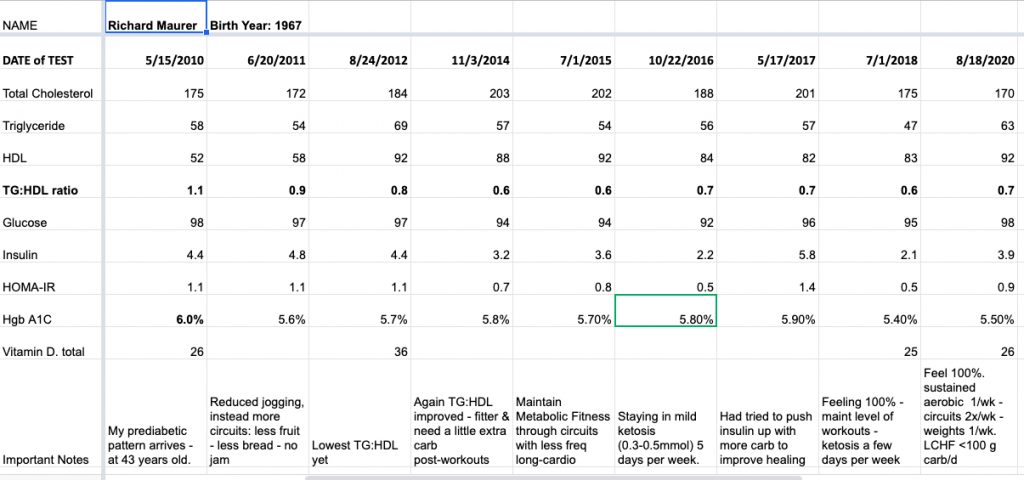I kept this article in my email because I know I had to write about it, but it was just absurd. It is 2020, and the headline is an ever-obvious finding,
“Carb restriction may aid glycemic control in prediabetes.”
This was a study published in the journal Diabetes and found that…”patients with prediabetes could attain a normal blood glucose level, as well as prevent progression of their prediabetes to type 2 diabetes, by undertaking a continuous care intervention emphasizing carbohydrate restriction for two years.”
I fully appreciate the work that the VIRTA health does, the group that funded and performed the study. I would love to get past this though, to get to the bigger questions like when the low carb diet fails to correct blood sugars. (I wrote about that here btw)
Do low carb diets work to lower blood sugar, YES! Most of the time. This is why lab work is so helpful—how do you know whether you are the “most of the time” or not.
This is why I ran my labs a couple weeks ago. [This and that I wanted to run my and my mothers IgG COVID antibody – more on that in the next post] I remain pretty low carb, but if you have seen me in the past…well, anytime in my life, you’d know that my goal is not weight loss. In fact, strength/weight gain is more my elusive Holy Grail. So I wonder, and measure, whether my low carb intake, in my mid-fifties is leading me toward the metabolic health I desire.
This is not rocket science, it is just the Blood Code Progress and/or Discovery Panel over the years. Yes I’ve added hormones in the past, and I have done the cardiovascular risk panel. But really the details are here too. Ten years ago, at – I was prediabetic with a relatively low HDL, especially for a “runner”. I am only 5 pounds heavier than 5 years ago – but that gain in muscle mass has resulted in a healthier cardio-metabolic profile – my HDL cholesterol is higher even though I spend less time “exercising” than I used to. And my blood sugar average is in a mid healthy range. Note, be cautious of anyone who touts that your morning fasting blood sugar “must be on the low side of normal” – 80 is not better than 90, period. There is no evidence to support this “if a little control is good, more must be better” claim. I tend to be in the 90’s which is why my breakfast is the lowest carb meal of my day.

What did I learn? That my body is still thriving in my current low carb environment—my HgbA1c is <5.7 (no longer prediabetes) and my HDL cholesterol is at the highest ever and that my TG is above 40, which means I have some fats energy in the tank when I need it.

What else did I learn? That at the end of the sunny summer in Maine…I am still low in vitamin D. Yes, I typically stop my extra D supplement in May thinking my activity in the sun will do it’s magic. But alas. In part, I hail from a line of good peasant stock from Sicily. I think I was meant to go outside when the day starts and return only at the days end. As I sit writing this, in a room with no windows, I am productive in words but not in the pre-steroidal compound Vitamin D. Therefore, as of this week, I am back to adding 2000 iu of vitamin D3 most days even though it is well-present in my multiple daily supplement.
I’ll add, how glad I am that I ran this test. Because I wrote in early March about why coronavirus infection, including COVID-19 does not make me afraid for my personal health. https://thebloodcode.com/why-i-dont-fear-coronavirus/ -And in this article, I state the importance of ample vitamin D, oops. (see the protocol in the second half of the article).
Run your labwork. Your health is too important to go by what “someone else” says. Avoid the one-size-fits-all approach to your diet and fitness and get on a plan that works for you for the long haul.
Which Labs?
My bang for the buck is #1 in this list of featured tests, The Blood Code Discovery Panel. You can see, this is the one I default to for my prediabetic correction. If you have unique risks, like cardiovascular risk or are pushing your fitness to a higher degree than normal, use the Blood Code #5 or #7 respectively.




Comments are closed.